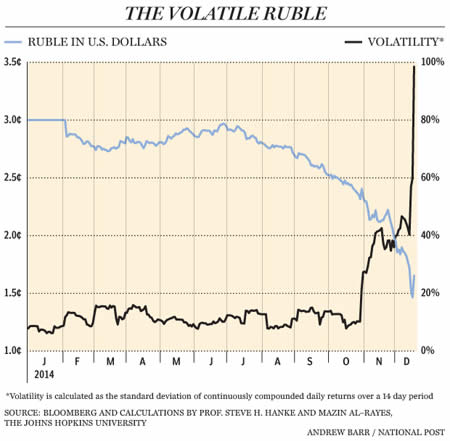The Link between the Ruble and Keynes
Currencies / Russia Dec 20, 2014 - 09:26 PM GMTBy: Steve_H_Hanke
 On March 3, 2014, the United States went to war with Russia. That’s when the U.S. first imposed sanctions. And, yes, sanctions are nothing more than war by non-military means. Then, on November 11 Russia committed a major misstep. It floated the ruble. Since then, the ruble hasn’t floated on a sea of tranquility. It has plunged in lockstep with oil — by about 25% and its volatility has soared to around 65%.
On March 3, 2014, the United States went to war with Russia. That’s when the U.S. first imposed sanctions. And, yes, sanctions are nothing more than war by non-military means. Then, on November 11 Russia committed a major misstep. It floated the ruble. Since then, the ruble hasn’t floated on a sea of tranquility. It has plunged in lockstep with oil — by about 25% and its volatility has soared to around 65%.
The ruble’s plunge means that Russian imports will be more expensive and exports more competitive. This combination will help keep Russia’s current account positive, which will offset some of Russia’s massive capital flight.
In addition, Russia’s fiscal accounts are denominated in depreciating rubles and its oil exports are invoiced in appreciating U.S. dollars. So, the fiscal blow from lower oil prices will be cushioned by a weak ruble.
But, there are limits to any temporary benefits from a ruble rout. When a currency takes a dive, the specter of inflation is always right around the corner. How can Russia avoid further damage and correct for its error of November 11?
Russia should abandon the floating exchange-rate regime, which it adopted on November 10. Oil and other commodities that Russia exports are priced and invoiced in U.S. dollars. By embracing a floating exchange-rate regime, Russia is inviting instability. The ruble’s nominal exchange rate will fluctuate with oil and other commodity prices. When the price of oil rises (falls) the ruble will appreciate (depreciate), and Russia will experience a roller-coaster ride distinguished by deflationary lows and inflationary highs. To avoid these wild rides, most of the big oil producers — Saudi Arabia, Kuwait, Qatar and the United Arab Emirates — link their currencies to the U.S. dollar. Russia should do the same.

To get things right, Russia should lift a page from John Maynard Keynes’ Russian playbook and establish a currency board.
Under a currency board system a central bank issues notes and coins. These are convertible into a foreign reserve currency at a fixed rate and on demand. As reserves, the monetary authority holds high-quality, interest bearing securities denominated in the reserve currency. Its reserves are equal to 100 per cent, or slightly more, of its notes and coins in circulation, as set by law. A central bank operating under a currency board rules does not accept deposits and it generates income from the difference between the interest paid on the securities it holds and the expense of maintaining its note and coin in circulation. It has no discretionary monetary policy. Instead, market forces alone determine the money supply.
There is an historical precedent in Russia for a currency board. After the Bolshevik Revolution, when troops from Britain and other allied nations invaded northern Russia, the currency was in chaos. The Russian civil war had begun, and every party involved in the conflict was issuing its own near-worthless money. There were more than 2,000 separate issuers of fiat rubles.
To facilitate trade, the British established a National Emission Caisse for northern Russia in 1918. The Caisse issued “British ruble” notes. They were backed by pounds sterling and convertible into pounds at a fixed rate. Kurt Schuler and I discovered documents at the archives in the British Foreign Office which prove that the father of the British ruble was none other than John Maynard Keynes, who was a British Treasury official at the time.
Despite the civil war, the British ruble was a great success. The currency never deviated from its fixed exchange rate with the British pound. In contrast to other Russian rubles, the British ruble was a reliable store of value. Naturally, the British ruble drove other rubles out of circulation. Unfortunately, the British ruble’s life was brief: The National Emission Caisse ceased operation in 1920, after allied troops withdrew from Russia.
Yes, it is time for Putin to lift a page from Keynes and follow what most large non-U.S. oil producers already do: link the ruble to the greenback.
By Steve H. Hanke
www.cato.org/people/hanke.html
Twitter: @Steve_Hanke
Steve H. Hanke is a Professor of Applied Economics and Co-Director of the Institute for Applied Economics, Global Health, and the Study of Business Enterprise at The Johns Hopkins University in Baltimore. Prof. Hanke is also a Senior Fellow at the Cato Institute in Washington, D.C.; a Distinguished Professor at the Universitas Pelita Harapan in Jakarta, Indonesia; a Senior Advisor at the Renmin University of China’s International Monetary Research Institute in Beijing; a Special Counselor to the Center for Financial Stability in New York; a member of the National Bank of Kuwait’s International Advisory Board (chaired by Sir John Major); a member of the Financial Advisory Council of the United Arab Emirates; and a contributing editor at Globe Asia Magazine.
Copyright © 2014 Steve H. Hanke - All Rights Reserved
Disclaimer: The above is a matter of opinion provided for general information purposes only and is not intended as investment advice. Information and analysis above are derived from sources and utilising methods believed to be reliable, but we cannot accept responsibility for any losses you may incur as a result of this analysis. Individuals should consult with their personal financial advisors.
Steve H. Hanke Archive |
© 2005-2022 http://www.MarketOracle.co.uk - The Market Oracle is a FREE Daily Financial Markets Analysis & Forecasting online publication.



